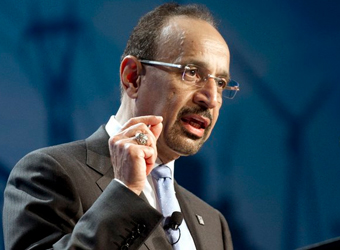Oil prices whipsawed Thursday morning as traders reacted to comments from OPEC delegates ahead of a widely anticipated extension of the OPEC-led production cut agreement.
“Nine months with the same level of production that our member countries have been producing at is a very safe and almost certain option to do the trick,” Khalid Al-Falih, Saudi Arabia’s energy and industry oil minister told CNBC ahead of the closed-door meeting on Thursday.
Saudi Arabia’s delegate explained while all options had been considered ahead of the announcement – including deeper cuts and a possible six-month extension – he suggested reaching an agreement to curtail oil production by a further nine months appeared the “safe bet”.
Oil prices contracted sharply just minutes after Falih’s comments, with Brent, the international crude oil benchmark, shedding $1 a barrel immediately afterward.
“Oil prices are always choppy at this point” Miswin Mahesh, oil analyst at Enegry Apects told CNBC via telephone.
The slip in oil prices “was probably triggered” by “imbalances” in the market.
At around 10.00 a.m. London time, Brent had recovered to trade 0.1 percent higher at $54.11 a barrel with the U.S. West Texas Intermediate (WTI) benchmark edging up by nearly the same amount to sit at $51.37 a barrel.
A nine-month extension of the deal is the most likely outcome to be announced at OPEC’s post-meeting press conference due to be held at 5:00 p.m. local time in Vienna, according to analysts at Barclays.
A key risk to OPEC only agreeing a six-month extension is that it would expire shortly ahead of the seasonally weak first quarter in 2018, bringing idle capacity back online at a time of poor market demand, said the Barclays’ note.
Brent and WTI futures prices have tracked 13 percent and 14 percent higher respectively since this month’s lows were reached on May 4, as hopes for a nine-month extension have risen on the back of increasingly supportive comments from Saudi Arabia, Iran and Iraq for such a result.
However, even a nine-month extension would be woefully insignificant, according to Johannes Benigni, chairman of JBC Energy Group, who claims market observers have always been too optimistic and that oil supply and demand will not be balanced before the end of 2019.
“OPEC now giving a signal they’re going to 2018 is great but you will see they have to roll on with their cuts. They will have to go to the end of next year and beyond,” said Benigni, talking to CNBC outside of OPEC’s Vienna headquarters ahead of the cartel’s meeting on Thursday.
Reading through Benigni’s predictions to get a sense of potential prices, the oil industry veteran warns that given the market is unlikely to be tight even as far out as 2020, forecasts for a $60 or $70 per barrel oil price are overly optimistic.
Furthermore, the reaction of U.S. shale producers will be a key factor in establishing price levels, said Benigni, adding “this supply response is a little bit of a risk for OPEC so if prices go really up it may not be in their interest.”
The U.S. shale market is currently in the process of rebalancing, according to the JBC chairman, who says that the era of falling production costs has now been replaced by stability but could soon turn to a climate of rising costs.
Turning to the question of compliance with the agreement, which is key to its success, Benigni warns that Kazakhstan may not be hugely interested in demonstrating discipline. With regards to Russia, he believes that domestic oil companies will fall in line with President Vladimir Putin’s wishes. Therefore, provided Putin is on board, Russia should co-operate – however, the price the president and his compatriots will pay for participation is rising.
“Up to now, Russia managed very well with maintenance of their fields to basically make a natural cut but going forward they have much more potential. For them now not to produce as much as they can is very difficult to do,” Benigni explained.
Turning to other key deal participants, Benigni highlights that Iran and Iraq are coming from very different starting points.
“The Iranians don’t yet have more volume to offer so they must be very happy with this on the table. For the Iraqis it is more of a question mark because they could do much more – so for them not to do it is like – really?”
Source: CNBC
